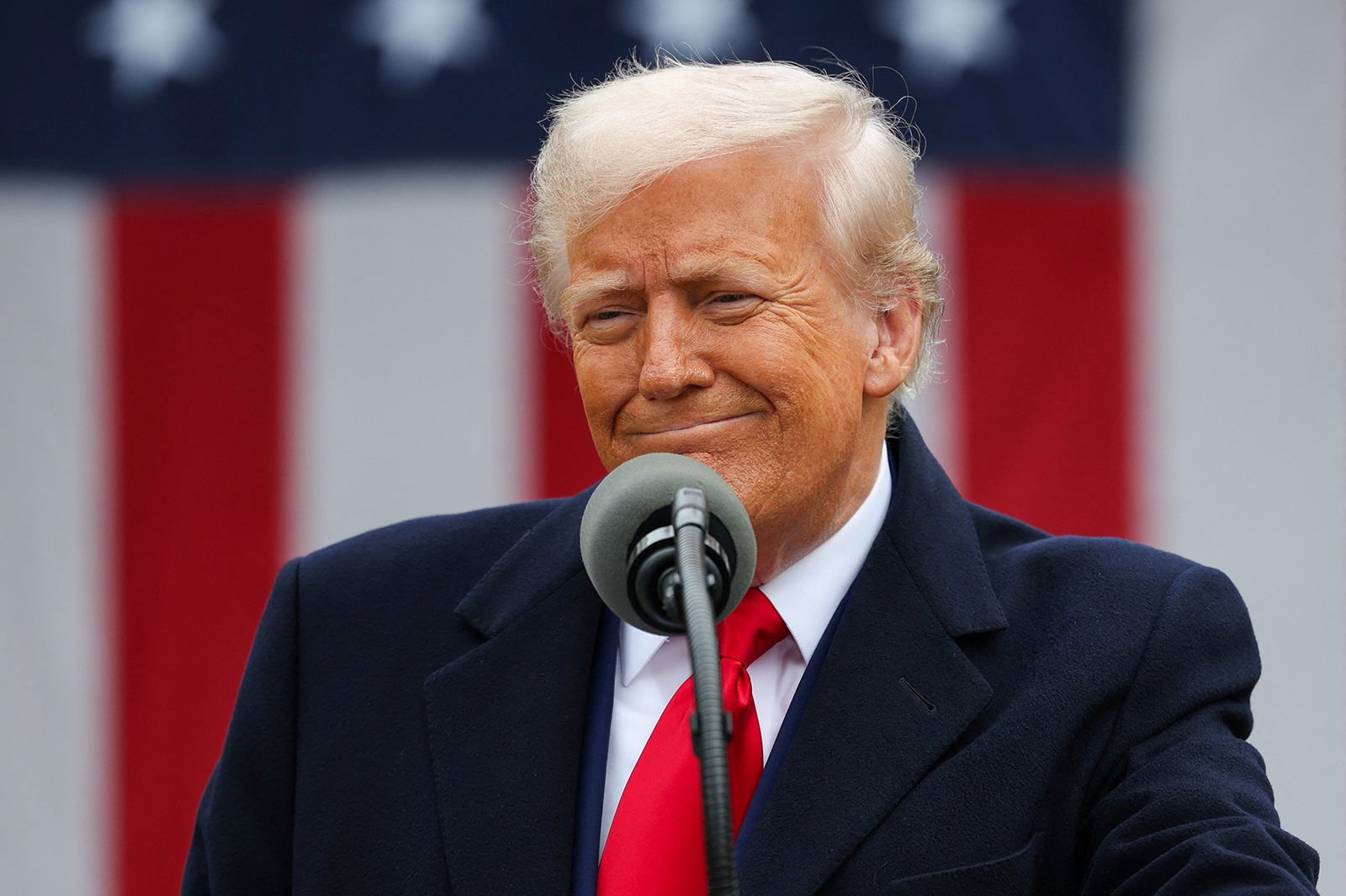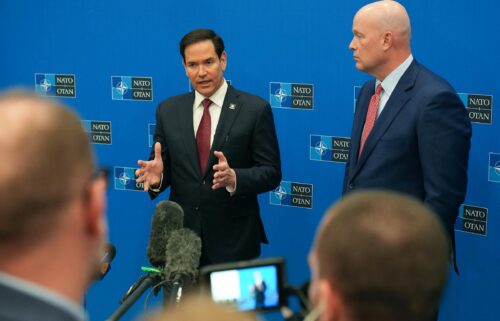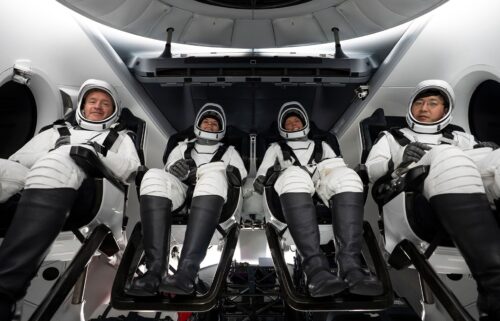GOP lawmakers, foreign leaders and markets wait to see if Trump’s tariffs are open for negotiation

President Donald Trump reacts as he delivers remarks on tariffs in the Rose Garden at the White House in Washington
By Kevin Liptak, CNN
(CNN) — As President Donald Trump departed the White House on Thursday afternoon — his first time in public since announcing sweeping new tariffs that have jolted global markets and sparked recession fears — he likened the duties he imposed this week to a successful medical procedure.
“I think it’s going well,” Trump said, as the Dow Jones Industrial Average traded down more than 3% and as one US automaker laid off 900 hourly workers, citing reduced production prompted by the tariffs. “It was an operation, when like a patient gets operated on,” the president said.
In reality, the operation hasn’t even begun. The new duties he announced will take effect at the end of this week and next, likely thrusting the global economy into uncharted territory and putting Trump’s economic acumen to the test.
But how much the president is willing to bend on his new tariffs was a question foreign leaders, Republican lawmakers and Wall Street investors were all asking as the tariff plan came into sharper focus.
The message from Trump’s top advisers was one of resolute commitment to the heavy duties applied to all US trading partners, friend and foe alike. “The president is not going to back off,” Commerce Secretary Howard Lutnick told CNN’s Pamela Brown in an interview Thursday.
But the president himself suggested he was open for talks — if the terms were good enough.
“Every country has called us. That’s the beauty of what we do, we put ourselves in the driver’s seat,” Trump told reporters aboard Air Force One as Lutnick stood behind him.
“If we would have asked these countries to do us a favor, they would have said no,” Trump went on. “Now they will do anything for us.”
Trump and his team have offered sanguine proclamations against the dire economic warnings, suggesting days of red on Wall Street and price increases for American consumers are worth it if it meant Trump’s big goals — the reorientation of the entire global economy and a resurgence of American manufacturing — are met down the road.
But even Republicans who said they supported Trump’s attempts to realign global trade suggested they were watching for some kind of calibration by the administration.
“Right now we are all kind of waiting and seeing and seeing how the administration reacts and what the ultimate permanent policy may look like,” Senate Majority Leader John Thune said, suggesting the tariffs Trump announced from the Rose Garden a day earlier were not, in fact, the final word on the matter.
And overseas, American diplomats were facing questions from governments who struggled to understand how the new tariff rates were calculated on their countries — or, in some cases, on uninhabited islands that export virtually nothing.
Secretary of State Marco Rubio, who left the Rose Garden announcement and headed directly to his airplane, was in Brussels, where the new tariffs hung over a meeting of NATO foreign ministers like a black cloud.
Muted reaction on Capitol Hill
As markets shuttered and global leaders threatened retaliation, the president himself evinced little worry. He emerged from the White House midafternoon Thursday and predicted a quick turnaround in the markets.
“The markets are going to boom, the stock is going to boom, the country is going to boom,” Trump told reporters gathered on the White House South Lawn.
Trump was heading to Florida, where he was scheduled to attend a golf tournament at his Doral club outside Miami before retreating to Mar-a-Lago for the weekend. The tariff matter had consumed much of his time this week as the president determined how, precisely, to proceed with the tariffs he’d spent the last six weeks promising.
In meetings with his trade team, Trump pushed advisers for a plan that couldn’t be labeled soft or weak, mindful that some previous moves on tariffs had the appearance of backing down from his previous threats.
His team prepared stacks of analyses, reports and individual plans to apply new tariffs that could be described as “reciprocal,” the term Trump has used to justify starting a global trade war.
After debating various ideas — including a draft plan applying a 20% universal tariff on all imported goods and a tiered system that placed countries into bands of new tariff rates — by Tuesday the president and his team arrived at the tariff scheme he announced from the Rose Garden a day later.
The tariff rates assigned to each country — revealed on cardboard signs the president pointed to, with the numbers only visible to those in the front rows — initially prompted confusion. It was only later that it became clear they were not, in fact, dollar-for-dollar comparisons to countries’ own tariffs but a different calculation altogether, using trade surplus numbers.
The announcement, which was attended by steel workers, pipe fitters, truck drivers and some Republican leaders, received a muted reception even from some of the president’s top allies on Capitol Hill.
Thune, who hails from the agricultural state of South Dakota, said the short-term market reaction to Trump’s tariffs proposal was not “unexpected” even as he cautioned there must be vigilance to make sure certain sectors of the economy aren’t damaged by the long-term impacts of the tariffs.
“That’s not unexpected. The markets expectedly were going to react. This is again a policy. It’s a big policy change, bold policy change and I think it is going to take some time to determine what the ultimate impacts are going to be,” he said.
The wait-and-see approach was echoed by many Republicans in Congress who have argued Trump’s team must be given some runway to see the impact of this massive economic policy.
“Why don’t you ask me in two months,” said Iowa Sen. Chuck Grassley. “I think it’s a wait-and-see proposition.”
Both South Dakota and Iowa are states with heavy agricultural interests that may have to now pay more to import Canadian fertilizer and find it more difficult to export their commodities. But despite their deep concerns about tariffs, Thune, Grassley and many other Republicans have been reluctant to criticize Trump’s moves.
Questions overseas about the administration’s willingness to negotiate
Trump’s tariff rollout stunned foreign diplomats in Washington, some of whom said they stayed up most of the night to analyze and answer questions from their capitals.
Some Trump allies are giving diplomats clear advice: Tell their governments to stay out of it, three sources familiar with the conversations said. Instead, send their companies doing business with the US into White House meetings in order to prompt the administration to make a deal, the sources said.
Some close to the president, however, suggested he would be flexible as leaders scramble to lower the tariff rates.
“I wouldn’t want to be the last country that tries to negotiate a trade deal with @realDonaldTrump,” the president’s son Eric Trump wrote on X. “The first to negotiate will win – the last will absolutely lose. I have seen this movie my entire life…”
But Donald Trump’s claim that other countries “will do anything for us” now wasn’t immediately evident for Rubio in Brussels, where potentially difficult discussions with NATO allies were underway Thursday, every single one of which was slapped with tariffs.
Officials said the tariffs news was hanging over some of the conversations and meetings, meant to focus on more NATO-specific issues like defense spending and the war in Ukraine.
“Obviously having this trade war going on makes it tough to do normal business,” said a Western official who told CNN that “it seems to be what most people are talking about.”
“And if they are talking about tariffs,” the official continued, “it means they aren’t talking about the other priorities NATO needs to focus on.”
On the surface, Rubio appeared to have been greeted warmly by the alliance’s secretary general, Mark Rutte, and his NATO counterparts. As they gathered for a group photo, Rubio chatted easily with the others, warmly shaking hands and kissing Canada’s Foreign Minister Melanie Joly on the cheeks.
Finnish Foreign Minister Elina Valtonen told CNN that the conversations have been “very constructive” and “very positive.”
“The tariffs aren’t the best news,” Valtonen said, “but I hope that this is an opening to a fruitful negotiation, especially between friends and allies, whereby we could reach a situation in which we effectively will let go of the existing trade barriers between us. Because that’s what we need.”
CNN’s Alex Marquardt, Ted Barrett, Manu Raju and Kylie Atwood contributed to this story.
The-CNN-Wire
™ & © 2025 Cable News Network, Inc., a Warner Bros. Discovery Company. All rights reserved.



